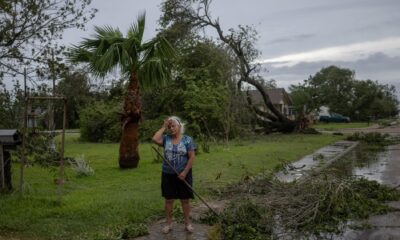For the fifth straight day, Saskatchewan’s active COVID-19 cases have increased and now sit at 2,549. This is the highest number reported since Jan. 26, when it was 2,665.
In the daily update, the death toll rose by one, and there have now been 455 COVID-19-related deaths in Saskatchewan since the pandemic began. The recently deceased was in their 60s from the Regina zone, according to a press release.
Read more:
Sask. Health warns of high COVID-19 exposure risk at Goodsoil restaurant
Health officials said on Monday there were 300 new cases, with the overall infection total in Saskatchewan now at 36,604.
The new seven-day average of new daily infections is up from 249 on April 11 to 261. The last time the average was reported higher, was on Jan. 25 at 265.
According to the provincial government, 3,485 variants of concern (VOC) cases have been identified in Saskatchewan and were reported in the far north west (7), far north east (1), north west (13), north central (39), north east (3), Saskatoon (181), central west (13), central east (94), Regina (2,423), south west (33), south central (309) and south east (348) zones. The residences of 21 VOC cases are pending.
The province’s hospitals are currently providing care for 198 patients with COVID-19 — 157 are receiving inpatient care and 41 are in intensive care.
Read more:
Sask. pharmacies to administer vaccines by mid-April: health minister
The total number of people who have recovered from the virus has grown to 33,600 following 253 more recoveries, provincial health officials said.
According to the press release, 3,093 COVID-19 tests were performed on April 11. To date, 707,648 tests have been carried out in the province.
A total of 290,921 doses of COVID-19 vaccine have been administered in Saskatchewan, provincial government officials said.


Questions about COVID-19? Here are some things you need to know:
Symptoms can include fever, cough and difficulty breathing — very similar to a cold or flu. Some people can develop a more severe illness. People most at risk of this include older adults and people with severe chronic medical conditions like heart, lung or kidney disease. If you develop symptoms, contact public health authorities.
To prevent the virus from spreading, experts recommend frequent handwashing and coughing into your sleeve. They also recommend minimizing contact with others, staying home as much as possible and maintaining a distance of two metres from other people if you go out. In situations where you can’t keep a safe distance from others, public health officials recommend the use of a non-medical face mask or covering to prevent spreading the respiratory droplets that can carry the virus. In some provinces and municipalities across the country, masks or face coverings are now mandatory in indoor public spaces.
For full COVID-19 coverage, visit the Global News coronavirus web page.
Must See
-




Entertainment
/ 3 days agoFaveSzn’s Revelation: Dating Choirmaster at 10 and Sexual Curiosity
Nigerian singer, Chidozie Ugochinyere, popularly known as FaveSzn, has revealed that she once dated...
By Flying Eze -






Europe
/ 3 days agoWhy Hungarian Prime Minister Orban visited
Two months later, the leaders of China and Hungary met again. Hungarian Prime Minister...
By Flying Eze -






News
/ 3 days agoThree dead and millions without power as Tropical Storm Beryl hits Texas
Man, 53, and woman, 74, killed by fallen trees and third person drowns amid...
By Flying Eze



